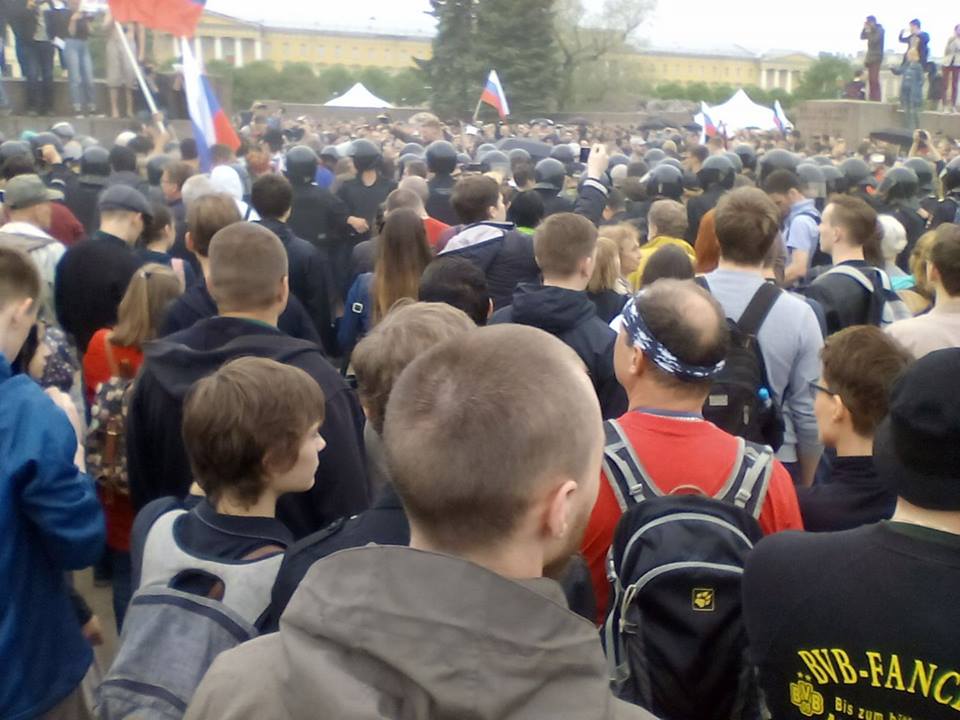Index relies entirely on the support of donors and readers to do its work.
Help us keep amplifying censored voices today.
[vc_row][vc_column][vc_column_text]

Protesters in St. Petersburg demonstrated against corruption in Russia (Photo: Andrey Kalikh)
Over the last seven days protests, lawsuits, and self-proclaimed governments have stopped journalists from doing their jobs in countries covered by Index on Censorship’s project Mapping Media Freedom.
Project Manager Hannah Machlin explains why incidents in Russia and Albania are particularly alarming.
“It’s appalling that around 1500 individuals were arrested — including journalists — at the anti-corruption rallies across Russia on Monday,” Machlin said.
Despite showing their press credentials, five journalists were detained including Index’s Mapping Media Freedom correspondent, Andrey Kalikh.
Machlin said, “Our previous reports and our monitoring of wave of anti-corruption rallies indicate that the trend of arresting journalists for doing their job will not abate.”
Machlin said the situation in Albania is also worrying because “a judge, who is in a position of influence, is now attempting to silence journalists who were investigating criminal investigations into him and his family.” She explained, “investigative reporters are consistently targeted when uncovering corruption of state officials and we must call on government institutions to allow journalists to freely report.”
Russia: Five journalists detained including one Mapping Media Freedom correspondent
12 June, 2017 – An anti-corruption rallies proved to be a dangerous place for journalists on 12 June. The rallies were called by opposition figure Alexei Nalvalny in a long-term attempt to overthrow Vladimir Putin.
At a rally in Moscow, reporter Ignacio Ortega for a Spanish news agency, EFE, in Moscow was arrested while reporting on the event. After identifying himself with his press card at the station, he was released.
Photographer David Frenkel, contributor to Kommersant and Mediazona, and Ksenia Morozova, a journalist for Sobaka.ru a local website, were both detained despite showing their press cards while covering the anti-corruption rally in St. Petersburg. Frenkel was soon released but Morozova was held overnight before a trial for “public order disturbance.”
Reporter Andrey Poznaykov of Echo of Moscow radio station went to a café for a break where he was detained by policemen even after showing his press card. In his blog, he said he was detained for covering the anti-corruption rally in Moscow. Poznaykov was released shortly after being taken to a police van.
Mapping Media Freedom correspondent, Andrey Kaikh, was detained at an anti-corruption rally in St. Petersburg. From a police bus he wrote he was amongst 40 others at a peaceful demonstration. So far, about 300 protesters have been detained in St. Petersburg. Kaikh was fined 150 Euros and released him at the end of the day on 13 June.
Albania: Four journalists and two media outlets sued by judge for reporting
9 June, 2017 – A court of appeals judge in Tirana sued four journalists and two media outlets for their coverage of his criminal investigations and his family’s declared assets. Judge Gjin Gjoni says the reporting causing reputational damage and pain.
The charges were filed against Balkan Investigative Reporting Network (BIRN) along with their journalist Besar Likmeta and Aleksandra Bogdani and Shqiptarja newspaper, along with their journalists Adriatic Doci and Elton Qyno.
The judge and his wife are asking for 7 million Lek (54, 000 EUR) in compensation from Balkan Investigative Reporting Network, BIRN in Tirana and two of their journalists; They are asking for 4 million Lek (30,000 EUR) from Shqiptarja newspaper and two from their journalists.
BIRN Albania, Adriatik Doci and the Union of Albanian Journalists have all spoken out about the lawsuit.
Ukraine: Journalist disappears in self-proclaimed DPR territory
2 June, 2017 – Ukrainian blogger and writer Stanyslav Aseev disappeared in territory controlled by the self-proclaimed Donetsk People’s Republic. Aseev was reportedly detained by militants of the self-proclaimed DPR.
Aseev uses the alias Stanislav Vasin and contributes to a number of news outlets including Radio Liberty Donbas Realities project, Ukrayinska Pravda, Ukrainian week, Dzerkalo Tyzhnya. He also runs a prominent blog via Facebook.
Radio Liberty Donbass realities project editor-in-chief Tetyana Jakubowicz said their contact with Aseev had been lost on 2 June. That day Aseev’s latest report from territories held by separatists for Radio Liberty.
The journalist’s mother said his flat was broken into and noticed several of his belongings were missing including his laptop.
Fiona Frazer, the Head of the United Nations Human Rights Monitoring Mission in Ukraine, said that the mission was searching for Aseev, Radio Liberty reported.
“We are trying to understand exactly what was happening to him. We are still trying to gain access there to understand where he is “, Frazer said. She added that, as in other cases, “when militants detain people, responsibility for this is placed on those who control the territory”.
France: Labour minister files complaint over Libération article
9 June, 2017 – New French labour minister Muriel Pénicaud filed a complaint against an unknown person for theft, breach of professional confidentiality and possession of confidential information following the publication of an article in the Libération newspaper about the government’s labour reform projects, Libération reported.
“They were mad with anger,” a source at the Labour Ministry told Libération, about the reaction to the story. “They reacted with such violence that they terrorised all of the affected department.”
[/vc_column_text][/vc_column][/vc_row][vc_row][vc_column][vc_column_text]
Click on the bubbles to view reports or double-click to zoom in on specific regions. The full site can be accessed at https://mappingmediafreedom.org/[/vc_column_text][/vc_column][/vc_row][vc_row full_width=”stretch_row_content_no_spaces” content_placement=”middle”][vc_column][vc_single_image image=”91122″ img_size=”full” alignment=”center” onclick=”custom_link” link=”https://www.indexoncensorship.org/2017/05/stand-up-for-satire/”][/vc_column][/vc_row]
 Each week, Index on Censorship’s Mapping Media Freedom project verifies threats, violations and limitations faced by the media throughout the European Union and neighbouring countries. Here are five recent reports that give us cause for concern.
Each week, Index on Censorship’s Mapping Media Freedom project verifies threats, violations and limitations faced by the media throughout the European Union and neighbouring countries. Here are five recent reports that give us cause for concern.
Dear @carlbildt – my flat was raided today – for journalism.
Arresteringsorder utfärdad mot SvD-skribent https://t.co/cttcywRsJN via @SvD— YavuzBaydar (@yavuzbaydar) August 30, 2016
30 August 2016 – The home of veteran journalist and Index contributor Yavuz Baydar was raided by the police, the journalist reported via Twitter.
The raid came shortly after detention warrants were issued for 35 people including 27 journalists. As of 30 August, of the 27 journalists sought nine have been detained in Turkey while 18 other journalists are reportedly abroad.
Also read by Baydar: Turkey: Losing the rule of law
28 August 2016 – At around 10pm an unidentified individual threw a hand grenade at the house of Mentor Shala, the director of Kosovo’s public broadcaster RTK.
Shala and his family were inside at the time. No casualties were reported but according to the RTK director the explosion was strong and that it had shocked the whole neighbourhood.
Kosovo’s police are investigating the case, which is the second attack on national broadcaster RTK within a week. On 22 August 2016 an explosive device was thrown at the broadcaster’s headquarters.
President Hashim Thaci has condemned the attack. “Criminal attacks against media executives and their families threaten the privacy and freedom of speech, and at the same time seriously damage the image of Kosovo,” he told RTK.
Both attacks were claimed by a group called Rugovasit, which said in a written statement to RTK that the attack was “only a warning”.
Rugovasit blames RTK journalist Mentor Shala for only reporting the government’s perspective. “If he does not resign from RTK, his life is in danger,” they said.
27 August 2016 – Journalist and founder of news agency Novy Region, Alexander Shchetinin, was found dead in his apartment in Kiev.
The National Police confirmed in a statement that “a man with a gunshot wound to the head was discovered on the balcony”. He reportedly died between 8-9.30pm.
Police found cartridges, a gun and a letter at the scene. “The doors to the apartment were closed, the interior looks intact,” police reported.
“Until all the facts are established, until the examination and forensic examination is complete, we are investigating it as a murder,” said Kiev police chief Andrey Kryschenko. “The main lines of enquiry are suicide and connections with his professional activities.”
The Russian-born journalist had lived in the Ukrainian capital since 2005. He was often critical of the Russian government. In 2014, he refused Russian citizenship, later joined the National Union of Journalists of Ukraine.
20 August 2016 – Faeces was poured onto the prominent Russian journalist Yulia Latynina, who works for independent newspaper Novaya Gazeta and hosts a programme called Kod Dostupa at radio station Echo of Moscow.
According to Latynina, the incident took place close to the radio’s office at Novy Arbat in central Moscow. An unidentified individual in a motorcycle helmet perpetrated the attack, while his accomplice was waiting for him at a motorcycle nearby. The unidentified individuals fled the scene.
Latynina told Echo of Moscow that it was the 14th or the 15th time she has been attacked. She believes the assailants had been following her for a long time as they seemed to know her daily commute and where she parks her car.
Latynina also believes the incident is connected to her Novaya Gazeta investigations into billionaire Evgeny Prigozhin, who is close to Russian President Vladimir Putin. According to Latynina’s investigations, Prigozhin has orchestrated mass trolling on opposition activists in Saint Petersburg.
22 August 2016 – A prosecutor has asked for a three-month prison sentence for Faig Amirli, the director of the newspaper Azadliq, Radio Free Europe’s Azerbaijan Service.
Amirli’s lawyer declared that his client is being charged for spreading national and religious hatred, along with promoting religious sects and disturbing public order by performing religious activities.
Amirli was detained by a group of unidentified individuals on 20 August. At the time, his whereabouts were unknown while his house was searched by the representatives of Grave Crimes Unit.
Police claim they found literature related to Fethullah Gülen, the alleged orchestrator of the attempted coup in Turkey, in Amirli’s car.
His arrest is considered part of a new crackdown in Azerbaijan ahead of the September’s constitutional referendum.
Also read: Azadliq: “We are working under the dual threat of government harassment and financial insecurity”
Mapping Media Freedom
|

The importance of Norman Wisdom to Albanians during the Hoxha period cannot be overestimated, writes Mira Blushi
(more…)
A Tirana court has ordered Albania’s Top Channel TV to pay €400,000 compensation to Ylli Pango, the former Minister of Culture, Tourism, Youth and Sport after broadcasting hidden camera footage of him, asking a female job applicant to remove her clothes. Investigative programme, Fiks-Tarif, had sent undercover reporters to investigate allegations that, whilst in office, Pango was offering employment in return for sexual favours. When giving judgement, the court said they found in favour of Pango because the recordings had been obtained illegally.